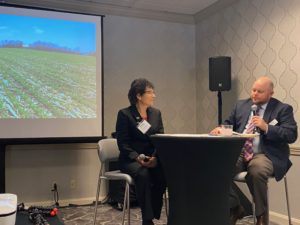Trade winds blowing; Eric Wenberg talks SSGA’s mission with Gov. Tim Walz
By Eric Wenberg, executive director
I had the privilege to attend MN AG EXPO last week near the Specialty Soya and Grains Allliance’s (SSGA) home in Mankato. To a person, the farmers I met were concerned about trade and weather. The two can seem like the same thing sometimes. Is it climate change or not? Is it just hot or cold today? Well, we want a little heat on the administration right now on trade. Market access for non-GMO and organic field crops are still subject to unfair labeling challenges that hold up your sales to China, as the issue was left out of the “Phase One” negotiations, finalized recently. SSGA has been in touch to raise your hope that the trade restricting domestic rules will be lifted during the next round of talks. We have trade deals with Japan, along with the USMCA, that are important to growers; however, there were nine other countries we could have traded with through the Trans Pacific Partnership (TPP), and we need the administration to do all they can to get further trade deals done.
Lower tariffs are important, but what we need is the best, scientific approach to phytosanitary and technical barriers to trade. We need vigor in talks with India. SSGA’s board will be in Washington, D.C., this spring to underscore those issues with agencies and legislators and their assistants on Capitol Hill. The farmers I spoke with at AG EXPO were grateful for the opportunity offered in the non-GMO or organic space with premiums, and welcomed information about our member companies working with corn, soy, and pulses in that area. There was interest in talking about identity-preserved (IP) practices and the need to support intermodal transportation. You have all heard me spout on about how a single container vessel can carry enough bananas to give everyone in America one or two. Container shipping touches all we eat and do. The toy train with shipping containers at our booth helped start the dialogue, and as members came by, I had to shuffle the containers just like port handlers do.
I also had the opportunity to speak one-on-one with Minnesota Gov. Tim Walz for a few minutes – thanks to the SSGA communications team pulling some strings and deftly pointing the governor to our booth. Gov. Walz gave support, and was interested in what it took to connect Minnesota to the globe. He left me in touch with his team, and I look forward to connecting with the governor in the future.
The IP hero of the week is Adam Geers at SSGA member company, MAC, in Michigan, who has been talking to state officials and anyone else under the sun about the upcoming new phytosanitary requirements in Japan, how they will differentially impact IP shippers worse than others and the urgent need for state and federal regulators to get behind a solution. SSGA will also be exhibiting at the Northern Corn and Soybean Expo Feb. 4 in Fargo, where we’ll continue to listen and educate.




